This summer we finally said goodbye to Jane the Virgin, and the TV Team has still not recovered. Jane’s telenovela stylized epic sprawled to tell the story of daughters and mothers who grew because of each other; of true love that could conquer any obstacle; of immigrants and U.S. Latinxs surviving in a country that’s hostile to their existence; of late-in-life bisexuals who come out to the support of their loved ones; of hot evil lesbian stepmothers whose hobbies include wearing the faces of other people’s faces as a high powered assassin. Ah, yes, we had it all.
Luckily our mourning was short lived! Starting this month, the all of Jane the Virgin is streaming on Netflix! So we can revisit every swoon-worthy music cue, sweeping kiss, and crying moment again and again. To mark the occasion, the Team got together to talk about all things Jane.
As of this month, the entirety of Jane the Virgin is now available on Netflix. All five seasons! What’s the first thing someone should know about JtV if they’re about to watch it for the very first time?
Natalie: Well, first of all, I’m so jealous of anyone who gets to step into this world for the first time.
Here’s the thing: I watch a lot of television – you know, for work – and when I’m watching any ensemble show, I have a tendency to gravitate to a few characters while growing to loathe a few others. I’ll devour storylines featuring the characters I care about, especially the queer ones, while begrudingly sitting through the storylines featuring characters I don’t. That’s been the case for nearly every other show I’ve ever watched, except for Jane the Virgin.
I cared about damn near every character on this show. I wanted love for Petra and Alba. I was invested in Xiomara’s health just as much as I hoped for Luisa to hold onto her sobriety. I wanted Jane’s career to flourish and for Rogelio to find success on the American small screen. And while I had my preference for who would win Jane’s heart, I wanted happiness for both Michael and Rafael. There wasn’t a character I truly loathed – well, besides Petra’s mom, but that was kind of the point – and I never once found myself wanting to fast-forward through anyone else’s storylines. It’s such a rare and incredible feat.
So if you’re about to dive into Jane for the first time that’s what you can expect: You’re going to love almost everybody. Straight, gay, old, young, male, female… you’re going to love them.
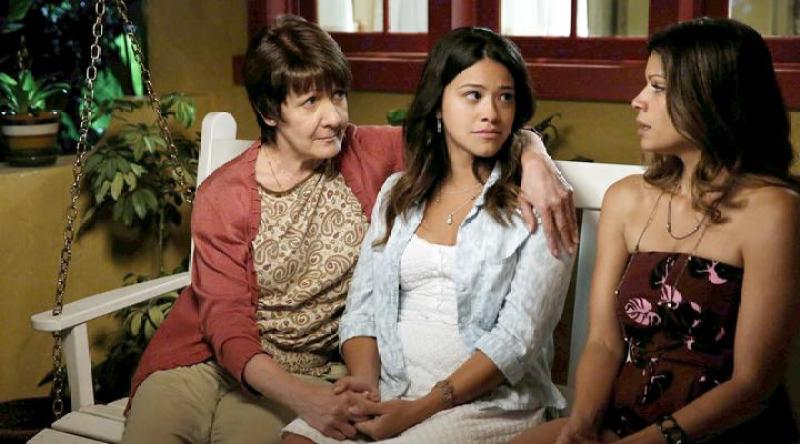
Jane the Virgin, Season One
Drew: I second Natalie. Anyone starting the show for the first time is so lucky!!
And, also, they should know that they are going to feel every emotion. The average Jane the Virgin episode made me laugh (a lot), usually I’d get turned on at some point, and then by the end I was fully crying. Every single episode of Jane feels like a fully packaged story with a little bit of everything, even within the complex season and show arcs. I’m aware that I just described the medium of television, but most shows aren’t as good at being episodic as Jane!
Carmen: Yep! If you are watching Jane the Virgin for the first time, you should be prepared to feel the full spectrum of human emotion! I consider Jane to be one of the most supremely written shows on television – ever. That’s a big statement to make, but I’m sticking to it. When talking about Jane the Virgin a lot of attention gets placed on Gina Rodriguez, and she’s a talent that definitely deserves acclaim, but the tightrope that Jane pulls off speaks the high quality of the writers’ room. It’s not easy to find the beats for dramatic honesty in between telenovela-style melodrama and comedy hijinks, but they find it every time.
Jane Villanueva lives in a heightened reality, but she and her family never felt fake. They were always grounded in something real.That’s what kept me coming back, and I think it’s going to make it extremely bingeable for newcomers.
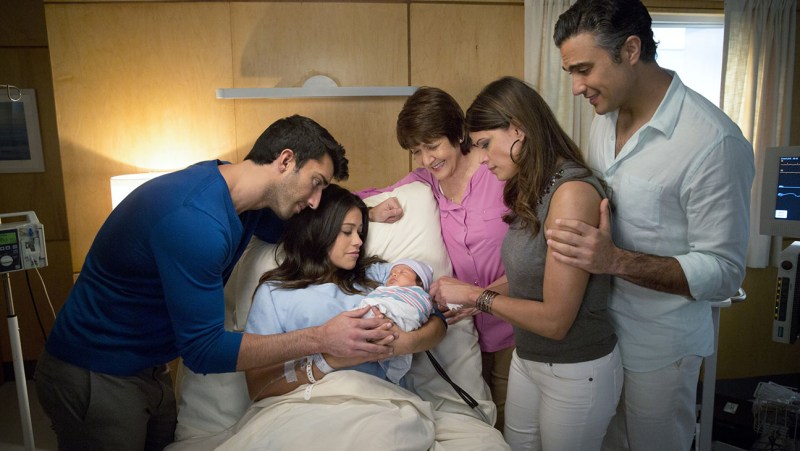
Jane the Virgin, Season One
Valerie Anne: I’m going to second what everyone else said but then also add: Go into it with zero expectations. Whatever you think you know about the show is probably wrong. So just go in as a blank slate with an open heart and get ready to love a bunch of women in all kinds of different ways. And also probably some of the men. Hell, I even loved the Narrator. Sit back and enjoy the ride, and like everyone else said, get ready to FEEEEEL!
And speaking of first times, when did you start watching Jane the Virgin? Was it right at the beginning, or did it take you a while to catch on?
Natalie: Looking back, I’m not sure how but I missed the start of Jane the Virgin. Maybe I was watching something else on Monday nights and just never got around to it, I don’t know. But I happened to be watching the Golden Globes back in 2015 when Gina Rodriguez won “Best Performance by an Actress in a Television Series – Musical or Comedy” and I was immediately taken by her.
“This award is so much more than myself,” she said. “It represents a culture that wants to see themselves as heroes. My father used to tell me to say every morning that today is going to be a great day. I can and I will. Well, Dad, today’s a great day. I can and I did.”
Carmen: ICONIC!! I just rewatched the clip and started crying all over again.
Natalie: She won me over in that moment and I knew I’d support whatever she did from that moment on (though, really, Gina, you could make it a little easier on me). The Globes were on Jan. 14th and by the time Jane returned from its winter break on Jan. 19th, I was already caught up.
In hindsight, everything about Gina’s speech – the centering of family (both real and chosen), the representation and the sincerity with which it was delivered – was so Jane... It’s why I came to the show, it’s what hooked me and it’s why I stayed until the very end.
Carmen: Natalie stole all my words and said them perfectly. I have nothing else to add. (Ooooh wait! Everything Natalie said plus also, I was obsessed because Gina Rodriguez was the only other Latina EVER to win a Leading Actress Golden Globe TV Award other than America Ferrera for Ugly Betty! In case you were wondering, no Latina has ever won that category in the Emmys, because of racism. And Gina was Puerto Rican! OK, moving on…)
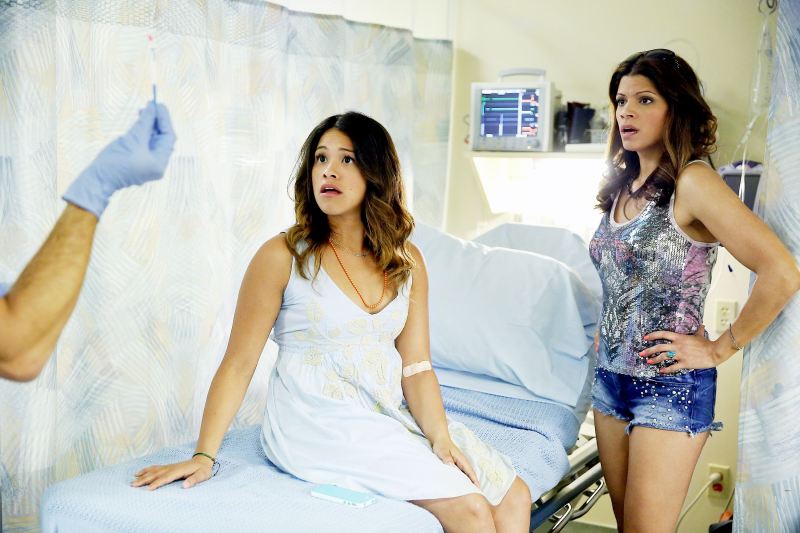
Jane the Virgin, Season One
Valerie Anne: I actually actively avoided this show when it was first on. The idea of a virgin being inseminated without her consent felt super rapey and terrible to me, and I didn’t think I’d ever be able to get over the squicky feeling even just THINKING about that gave me, so I actively refused to watch while the entire first season aired. But after reassurances from friends and the promise of an A+ queer love story, I started from the beginning while Season 2 was airing. I did feel that expected squicky feeling the entire first episode, but by the end of the second episode I was so enamored with Jane Villanueva and Gina Rodriguez that all of my uneasiness was gone. I was glad I powered through and got over my misconceptions, because thus began four years of joy and tears and laughter and queer love stories that I would have missed out on if I had given in to my preconcieved notions.
Kayla: I started watching the show just a couple weeks after it first aired. It was definitely on my radar but I didn’t watch the pilot live. It wasn’t until someone informed me that there were lesbians in it that I corrected that immediately and tuned in.
I was hooked instantly.
Everything from the bright colors to the fantastic characters to the telenovela tropes just grabbed me right away. Gina Rodriguez is a force to behold on television, and the way she harnesses the comedic and dramatic sides of this show is on display right away in those first few episodes.
FULL DISCLOSURE: I have not actually finished the final season. In fact, I’ve only seen about a third of the final season. While I do consider myself a superfan, I fell behind this year because I was going through a breakup, and I had to take a break from shows that I heavily associated with my ex, and this is certainly one of them. Then I got so far behind that it was impossible to catch up via the CW’s website. So now I’m in the process of finally finishing the last season, and lemme tell ya, it is a very emotional journey.
Drew: I actually started watching after the first season was on Netflix. I was looking to start a new show and watched the first episode of Fargo, which everyone had raved about, but I loathed it so much. The only person I’d seen be critical towards it was Emily Nussbaum so I tweeted at her: “Started Fargo. Nagging wife, violent men talking about masculinity, all white male writers/directors. Why should I watch this? Should I just start Jane the Virgin instead?” And she replied, yes.
I feel like that sort of started a shift in my viewing away from the “prestige” shows I was told to watch and an embracing of the queerer, more female shows I wanted to watch.
I very quickly realized upon starting the first season that just because the show was fun didn’t mean it was somehow less deep than something like Fargo.
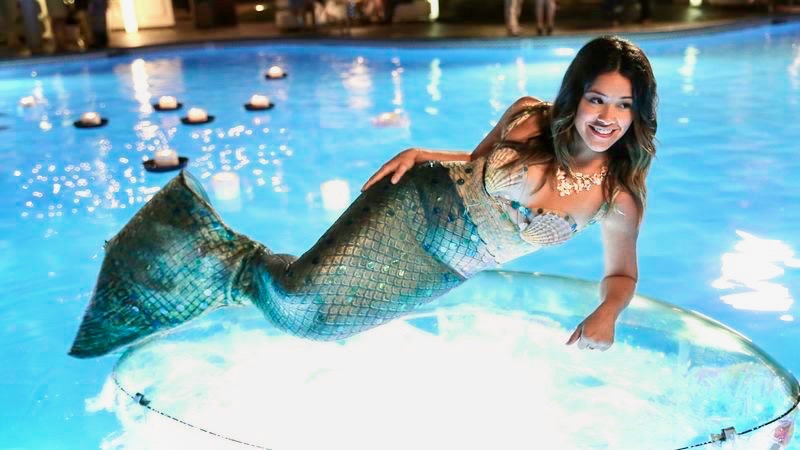
Jane the Virgin, Season One
Carmen: YES! I think so much of what made Jane the Virgin really special right away was its bright colors, its women centered point of view in front and behind the cameras. It rewrote the script on what could be “prestige” and it did while actually still having fun! Maybe that doesn’t sound monumental right now, but even five short years ago there was nothing else like it.
Let’s talk about Rose and Luisa! In one of Jane the Virgin’s final episodes, Rose calls her relationship with Luisa “one of the greatest love stories ever told.” Were you a fan of the couple? Do you ultimately think they were treated fairly by the show?
Kayla: Ahhhh, Rose and Luisa. I could probably write 10,000 words about Rose and Luisa, but I will try to keep this short. Rose and Luisa is one of my favorite canon ships of all time, full stop. Do I think they were always written well and problem-free? Absolutely not! One of the biggest yikes moments for me was when Rose had Luisa committed to a psych ward. Oh, right, and I guess when Rose kills Luisa’s father…
Honestly, the messiness is a big part of what draws me to Rose and Luisa. Their dynamic is deliciously soapy and plays into some great telenovela tropes. It was seeing gifsets of them from the pilot on Tumblr that initially got me to tune into the show. I mean…evil stepmom trope but make it GAY? Hello! Sign me the fuck up!
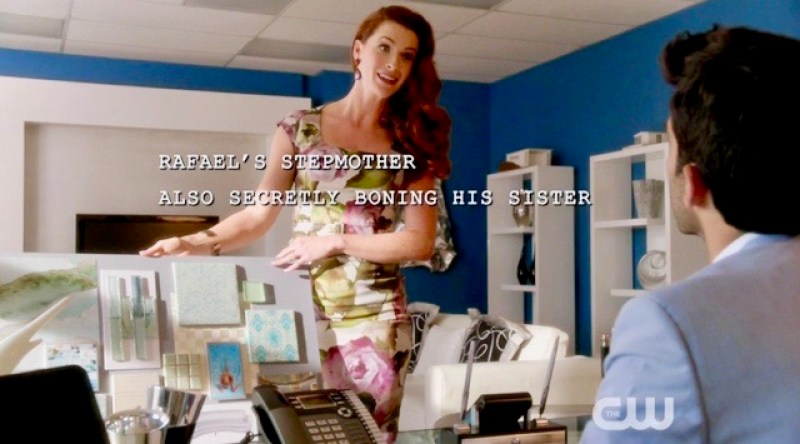
Jane the Virgin, Season One
Rose and Luisa work so well because Bridget Regan and Yara Martinez are brilliant. Martinez is one of the straight-up funniest people in the cast (but can also gut you during Luisa’s darker moments). This is an overused comparison for good actors, but Regan is truly a chameleon, and her approach to playing an over-the-top telenovela villain has occasional subtlety to it, which is definitely necessary to make the romance work.
Also, I feel like I always have to mention this when I’m writing about this show, but THEIR SEX SCENES? Very good. A+. I love that they always look sweaty and tired after sex; that is absolutely the lesbian representation I’m looking for. I mean, they had sex ONE HUNDRED FIFTY SIX TIMES on Rose’s submarine. My friend did the math and that was 5-6 times per day. Icons.
Valerie Anne: I loved Rose and Luisa from the start. I agree with everything Kayla said. Their chemistry was electric, and even Rose as a villain was a goddamned delight. I do think that’s largely due to Bridget Regan’s smirk being able to start and end wars, but I loved every problematic minute of their terrifying tango.
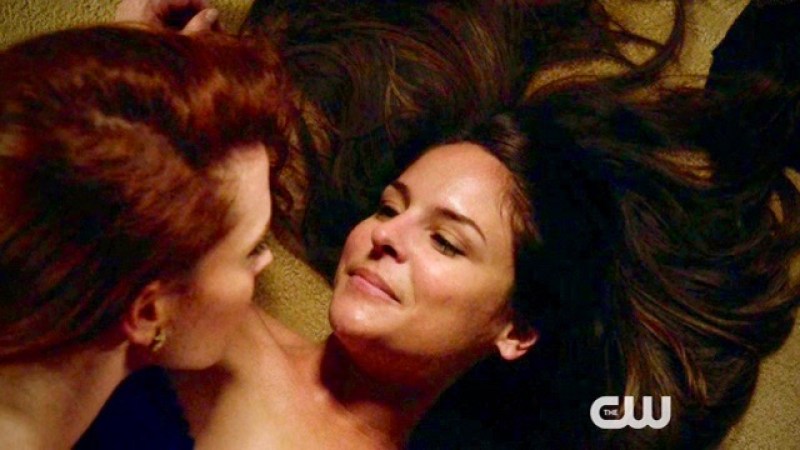
Jane the Virgin, Season One
Drew: I also agree with Kayla about both the actors and the sex!
Honestly, I was always a fan of Rose and Luisa. When I first started the show I wasn’t immersed in discussions around queer representation, but I was usually pretty sensitive to it on my own. They didn’t bother me because they always felt like people, or, at least, heightened telenovela people. I genuinely believe they loved each other and that shifts their queerness away from simply being a means of othering.
I love queer villains. I don’t love when queerness is villainized. That distinction is very clear to me and most of the time I think the show treated them right.
Natalie: I’ve been rewatching the first few seasons of Jane since the finale, trying to see exactly what Kayla (and a lot of fan fic writers) see in Rose and Luisa… but I don’t feel like the show gave us enough of them for me to develop an attachment.
Carmen: I completely agree.
Natalie: I wish there’d been an extended period with a healthy and sober Luisa and Rose as Rose, rather than Rose as Eileen or Rose as Susanna, so we could really understand what drew them to each other – besides the delicious, sweaty sex, I mean.
I think the show did the characters, that relationship and the overall narrative a disservice by only letting Luisa and Rose be plot devices. We’d go so long without seeing them that I’d forget what new age thing Luisa got herself roped into or how much of a villain Rose was. So much of Jane‘s final season was spent on reminding the audience how dastardly Rose was — she kidnapped Mateo and maybe did a baby switch — which they wouldn’t have had to do if they’d given Rose and Luisa a consistent presence on the show.
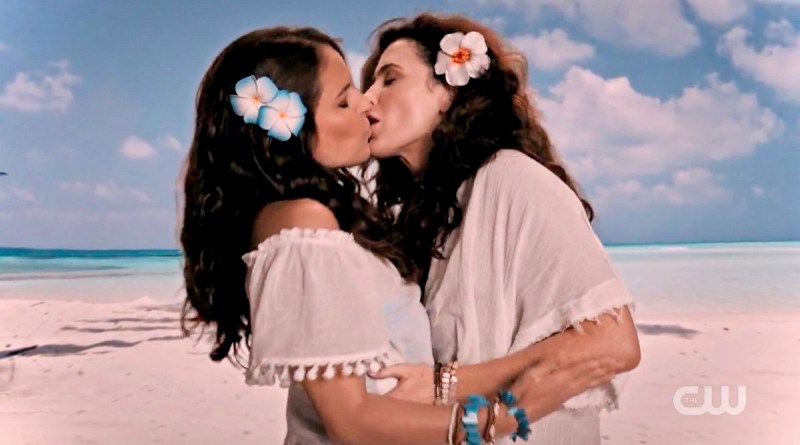
Jane the Virgin, Season Four
Carmen: This is maybe controversial (and my apologies to Kayla, whose opinion I hold in the highest regard on all things both television and queer step-mom tropes!), but I never liked Rose and Luisa. Not once!
I think Natalie already nailed down part of my problem, which was that Rose and Luisa were never given a consistent treatment, especially in the later seasons when they had written Sin Rostro into such a twisted cartoon villain knot that it was hard to figure out how to re-incorporate either character into the central narrative. But also, it always bothered me that Rose was manipulative of Luisa.
Granted, Rose/Sin Rostro is Jane the Virgin’s overarching Big Bad, so I probably shouldn’t expect her to have a full, healthy, respectful love life. I believe that Rose believed that she loved Luisa. I believe that for most of the series Luisa believed that she loved Rose. I also don’t swoon for unhealthy love stories. That’s just not who I am as a television viewer, I’m sorry!
In fact, Rose and Luisa became the most interesting to me in Jane the Virgin’s final season – after it became clear that Luisa understood Rose to be emotionally abusive. Once JtV signaled to me that they knew this wasn’t an ideal love story – and once we had JR and Petra as an alternative model for viewers – it was easier for me to find Rose’s relationship with Luisa compelling. I can’t say that I ever fell for them, but by the end they at least caught my attention. Like Drew said, “I love queer villains. I don’t love when queerness is villainized.” And Rose is going down as one of the greatest queer villains of all time.
Last year Valerie Anne called Petra Solano’s bisexuality “a love letter to Jane the Virgin fans.” It certainly felt like it at the time! Were you one of those fans who always read Petra as queer? Looking at Seasons Four and Five, how did her coming out arc (and subsequent relationship with JR) resonate for you?
Valerie Anne: I always read Petra’s obsession with Jane Villanueva as a crush she didn’t know what to do with, so when she got a Jane of her own, I was DELIGHTED. I covered most of that in the piece that was so graciously linked in the question. I loved it so much and I think they did such a great job of carrying that storyline through to the end, and letting Petra grow through and around her queerness, because of and in spite of it.
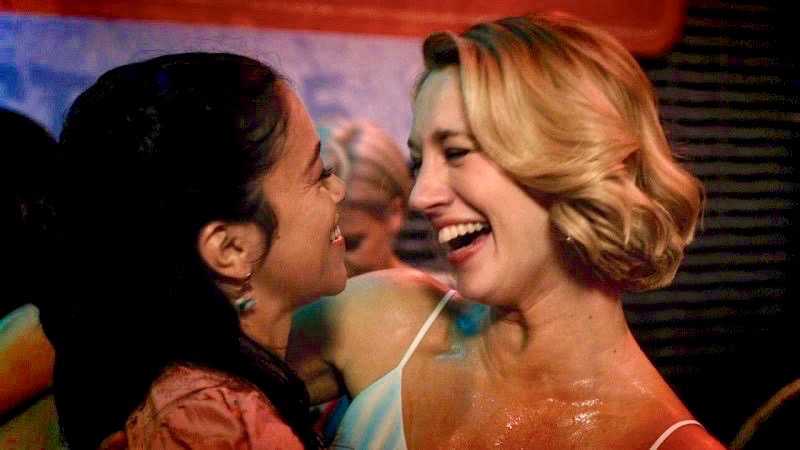
Jane the Virgin, Season Five
Kayla: It is difficult for me to answer this question credibly, because I read most television characters as queer lol whoops. But I did! I did read Petra as queer, mostly because I was one of those original recipe Jetra folks who was convinced Petra was in love with Jane Villanueva. Petra and Jane’s whole adversaries-turned-besties arc is extremely queer in my opinion. And even though that particular ship never came to fruition, it still felt like a revelation (revelgaytion?) and a win for us subtext truthers when Petra’s bisexuality finally bubbled to the surface.
I love Petra and JR’s relationship, because we really do get to see a different, sweet, nervous side of Petra. She’s used to being the one in complete control both in her life but also in her relationships. She walked all over Rafael. But JR has a different effect on her, and it’s very satisfying to watch Petra flail a little.
Carmen: It’s funny because I never read Petra as queer, but I started desparately rooting for her relationship with JR from the first second they shared a screen! A lot of that is because I had never seen Petra be, like, shy or nervous before. Not once in four years.
The storytelling decision to let Petra become vulnerable not only in her relationship with JR, but in her coming out over the last two years, that’s what really did me in. Petra started the series as Jane the Virgin’s version of an Ice Queen – perfect makeup, perfect dress, perfect heels. It’s a mask, and as someone who often hides behind my own quest for perfectionism, it’s one I relate to quite a bit. Coming out is messy. It’s embarrassing yourself by stalking your crush; it’s finally letting someone get to know you in a sloppy ponytail and sweats; it’s going to your first gay bar and making an idiot of yourself by entering a dance contest just to impress her friends. It’s crawling into your best friend’s bed in the middle of the night with your heart broken once it’s all over.
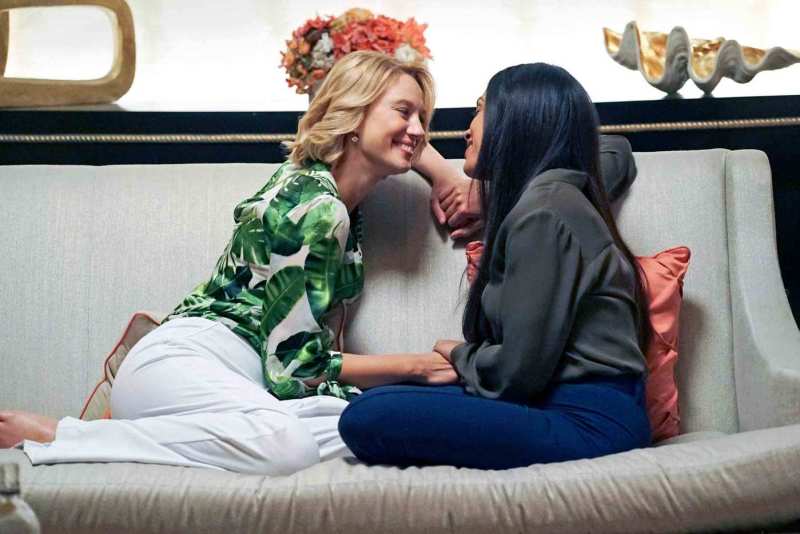
Jane the Virgin, Season Five
I never found Petra to be more human than she was with JR. She never lost track of the control freak that she was, but she began letting us in and pulling back her layers. I started off JtV barely tolerating Petra, and I ended it crying for her happiness. That’s more than just queerness – that’s queerness making your life better, making it rich and full. You know when you look back at your “straight” life and you go, “blah – that was a bore”? I don’t know if I’ve ever seen a show capture the ways that coming out fundamentally also means coming in to yourself better than what Jane the Virgin did with Petra Solano.
Natalie: So, I agree with you, Carmen, about how much Petra shifted from Season One — where she was this cold, calculating, unstoppable force who’s clinging to a loveless marriage to Rafael (for the money) — to whom she ended up being by the end of Jane‘s run, but I’m not sure I’d attribute it all to her coming out.
Petra is who she is in Season One because her mother, Magda, made her that way. She never knew that motherhood could be coupled with kindness or that family, generally, was something you could count on. She never knew relationships that weren’t purely transactional or how to build a life on something other than grifting. This is who Magda raised her to be. But then she meets Jane Villaneuva, who… if Petra’s this unstoppable force, she’s the immovable object… and as anyone who’s watched Imagine Me & You knows, those things can’t exist at the same time. So, Petra yields.
It’s through her relationship with Jane and the Villanuevas that she has a model for what motherhood is, for what family is, and is able to create one for herself. In Jane, she has a person that won’t give up on her, no matter how much she pushes her away, and it helps Petra trust in relationships more generally and, ultimately, opens her up to the possibility of real love. She gets to be vulnerable with JR because she learned how to be vulnerable through her relationship with Jane first.
Drew: I definitely always thought Petra was queer! But I never dreamed she actually would be! I wanted Jane’s love triangle to end with her and Petra together, but knowing straight television writers, I assumed it would end with Petra and Michael. Jane also reads very straight to me, so I wasn’t sure it made sense even if it’s what I wanted. (For the record, while Jane reads straight, Gina Rodriguez does not, hello Annihilation, anyway.) The introduction of JR was such a delightful surprise, especially because it happened right after Valencia came out on Crazy Ex-Girlfriend. All of a sudden these two characters I’d always hoped were queer, actually were!
And then the casting of Rosario Dawson!?!?
Carmen: Rosario! Respectfully, you will always be my dream girl! If you are reading this – call me!

Jane the Virgin, Season Four
Drew: That moment in the parking garage where JR kisses Petra “as a cover” is sexy and adorable, which pretty much sums up their whole relationship.
Valerie Anne: Having them kiss for ~undercover~ reasons is one of my favorite tropes, I don’t care how cheesy it is!!
In its very last episodes, Jane the Virgin gave quite the finale punch! First – and there’s no delicately way to put this – they buried a gay. Then, they wrote one of the most sweeping, big romantic television endings for a queer women couple that’s happened in recent television! Two very different endings for its two long-standing queer relationships. Sooo…. how was that rollercoaster ride for you?
Drew: I would actually push back against labeling Rose’s death as burying a gay.
Carmen: Drew, they literally buried a gay! She was lesbian. She died. The trope is only three words long for a reason.
Drew: Yes, it literally is that, but I think when discussing that as a trope there’s more than just a gay character dying. I think of it as a work killing off the only gay character or one half of the only gay relationship. I think of it as an unnecessary death done out of narrative laziness.
But in this case I don’t see how the show could have ended any other way. Rose was the main villain of the series and had already shown being in prison didn’t stop that villainy. Not killing her would’ve felt like leaving the show with loose ends. And I loved that Luisa was the one to push her. It felt like a really satisfying end to Luisa’s arc and their relationship and something about a queer killing another queer sits better for me.
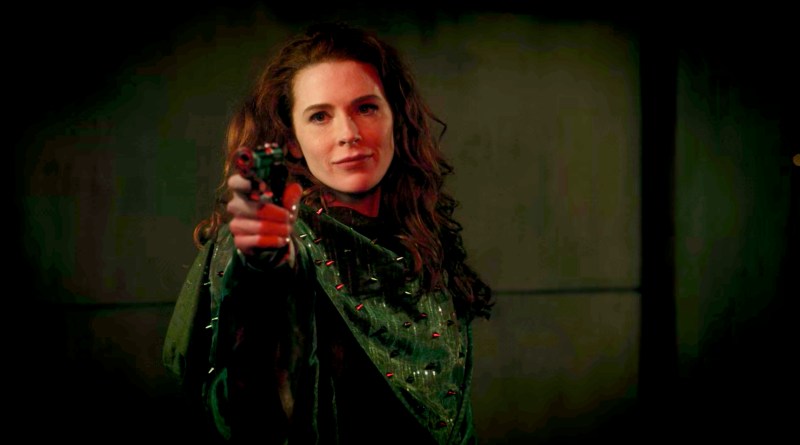
Jane the Virgin, Season Five
Carmen: Well, I do agree about that! I think that Luisa being the one to ultimately end her abuser’s life was an exclamation point to her own story arc and recovery. Rose ends by saying that she and Luisa were Jane the Virgin’s greatest love story, but I think by then Luisa had come to realize that she was her own greatest love story, and that’s really beautiful to me.
Drew: I love that the toxic queer relationship found a conclusion whereas the healthy queer relationship got a happy ending. This is why shows should have more than one queer relationship! It allows so much more freedom in storytelling because no couple has to represent all queerness.
Carmen: Yes Yes Yes.
Valerie Anne: It’s cute how you all think Rose is dead.
Drew: I went into the finale assuming Petra and JR would end up together, so I was surprised by how emotional it made me. But it really did make me emotional. It was meaningful to watch queer happiness included in this celebratory love story. Jane and Rafael may be the focus, but we got a happy ending too. And, actually, I got two happy endings as a queer lady who was always intensely committed to Team Rafael.
Valerie Anne: I was mostly #TeamAnyoneButMichael but I agree, Jane and Raf felt ideal for me by the end. And speaking of the end, I have been burned so many times that even though at the very beginning of the finale, Abuela flat-out told us that all telenovelas have happy endings, I was still holding my breath the entire time. When she came out of the bedroom to turn off the light and was having a memory montage, I 100% thought she was going to die and I was going to have to fling myself out a window. TV has given me trust issues, is what I learned.
I had just settled into being content with Petra realizing her career dreams as being her happy ending when JR strutted in and made all the dreams I didn’t dare to dream come true. It was absolutely perfect. It felt earned and not too easy. I haven’t felt that caught up in a romantic moment in a good, long time.
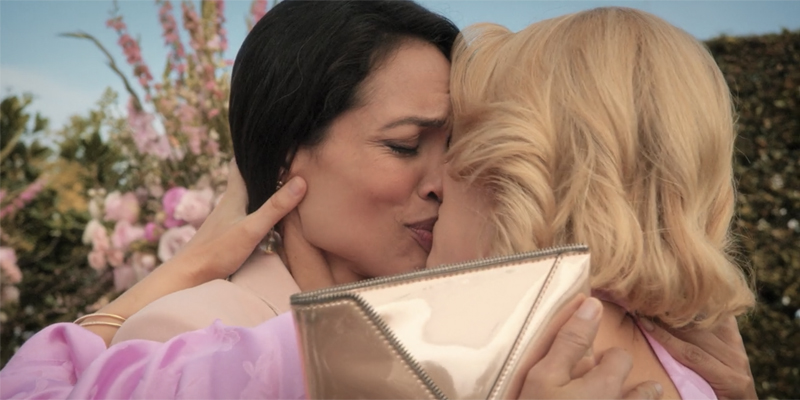
Jane the Virgin, Season Five
Carmen: Rosario Dawson in that suit showing up to that wedding took my breath away! She stole it, and I may never get it back. JR’s swag has always been my favorite thing about her, but in that moment? She finally made me understand why straight women swoon over Casablanca. This was my “Here’s Looking at You Kid.” This was my Big Romantic Gesture.
The swelling music! The perfect lighting! The swooping, huge kiss that went on… and on… and on. Later, the way that Petra looks at her during the vows. Even later still, when they stand together (with Luisa, holding it down for #TeamGay at a straight wedding realness) during the family photo. It’s perfect. IT’S ALL SO PERFECT. I don’t think I can ever stop screaming about the High Romance Gay Perfection that is JR coming back to Petra’s arms in the Jane the Virgin series finale. I’m going to be rocking in a rocking chair with dentures telling my grandkids it.
Whatever, I logically recognize that sounds hyperbolic – my heart will not be confined by reason – but statistically speaking, queer women on television do not get happy endings. That’s just math. In 2016, when Autostraddle started tracking the Dead Lesbians and Bisexuals List after a long, bloody year of television, Heather also compiled a then-definitive list of all the lesbian and bisexual “happy endings” on television. Want to guess the amount? 29! A whopping 29 happy lesbian/bi+ happy endings in all of television! That’s it! Of course, in the last three years we’ve added a few more to that handful, but consider this – the Dead Lesbian List currently has 208 entries (including Rose, by the way). Our stories on television remain overwhelmingly one-sided.
It would have been easy for Jane the Virgin to end the show with Petra single; owning the Marbella could have been her “happy ending.” Instead they made the conscious decision that a television show about love was going to mean love for everyone.
What do you think will be Jane the Virgin’s legacy? For queer women’s television and/or the television landscape more broadly?
Kayla: JtV felt special in its representation of queer women because it made them a very visible presence in the ensemble but also didn’t feel like it was just trying to check boxes when it comes to diversity. JtV’s sprawling cast – from regulars to secondaries to guests – was always very naturally diverse and extremely rooted in its setting of Miami (and, in particular, Latinx communities in Miami). The queer women on the show are fully formed, and their sex and love lives are important and treated with the same level of romance and drama as the other relationships on the show, but they also have a bunch of other storylines outside of their relationships.
There’s so much that makes this show special. I love intergenerational shows, Alba, and Xiomara and all the dynamics that exist between the three are given the same attention to detail and careful character work as the show’s central love triangle. This show is centered on three generations of complex, compelling, sometimes flawed women. I think it has featured some of the best on-screen kissing (even the straights!) and on-screen crying in TV history. I think The Narrator is one of the greatest omniscient narrators in TV history? And also a queer icon? Am I crying while writing about this show? MAYBE!!!!!!
Valerie Anne: The queerness on Jane the Virgin will go down in history as some of our greatest stories, but I think the fact that Jane the Virgin unapologetically centered around multiple women and their ambitions will be its true legacy. These women were mostly women of color, they were strong but flawed, they were different from each other, they would yell and laugh and cry and make mistakes but they were still always the heroes of our story. And it just so happened that some of those women were queer. Which seems like a pretty damn cool legacy to me.
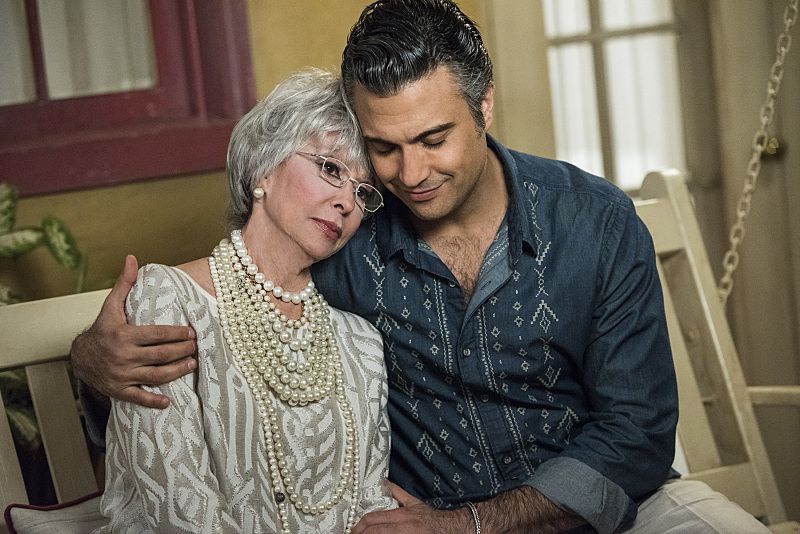
Jane the Virgin, Season Two
Carmen: A lot of this roundtable has focused on Jane the Virgin’s queerness (and rightfully so!), but I’d also hate to forget its legacy its for Latinx pop culture. Obviously it would be an understatement to say that there are painfully few television shows that showcase Latinx families and immigrant families in a positive light. In fact, a 2017 study showed that half of all Latinxs on television are portrayed as criminals! I don’t believe that every Latinx person on television needs to be seen as Mary Poppins, of course not. But we live in a time where anti-Latinx violence and hatred, starting at the very top of leadership in our country, is at a pinnacle high. On top of a centuries long history in this country of that very same violence and hatred. As the saying goes, “representation matters.” Allowing Latinxs to turn on the television and feel reprieve, allowing us to see our own humanity when so many white people are hell-bent on destroying us, that matters.
In addition to its own strong bench of Latina actresses in its regular cast (Gina Rodriguez, Andrea Navedo, Ivonne Coli, and Yara Martinez), JtV also welcomed a truly one-of-a-kind impressive roster of Latina guest stars. Over the course of its five years, Jane made a home for: Rosario Dawson, Justina Machado, Judy Reyes, Diane Guerrero – and the incomparable Rita Moreno. Having Rita Moreno return as Rogelio’s mother for the finale was perfection. Jane the Virgin is going down in Latinx television history, so it’s only fitting to have one of our most historic stars and brightest lights with them as they took their final bow.
Of course it also matters that a show this unapologetically proud of its Latinidad was also unapologetically queer. In addition to having two queer Latina characters in Luisa and JR, Season Four brought us Adam Alvaro – Jane’s old (and rekindled) boyfriend, who is bisexual. Not only did that storyline feature a really complicated but necessary conversation for Jane, it gave us one of the only bisexual men of color (particularly Latino men) on network television.
Drew: I think Jane reframed what it meant to be a prestige show.
Natalie: Thinking back to that night that I really fell in love with Gina Rodriguez at the Golden Globes, she beat out four white women in that category, including Edie Falco (an alum of the prestigiest of prestige TV shows, The Sopranos) and Julia Louis-Dreyfus, who’s one of the most celebrated TV actresses of all time. That put Jane in some exclusive company. The fact that a show about three generations of Latina women became part of the “prestige” conversation at that moment was truly groundbreaking.
With respect to Jane‘s queer legacy: I think there are still so few shows that allow multiple queer people to exist in the same space at the same time and I hope that Jane showed us and TV writers everywhere what’s possible. We’re used to shows with one queer character and any other queer character that exists within that space is obviously going to be that person’s love interest… and then when that’s over, we just go back to having that one character again. Jane really upended all of that and, hopefully, compelled folks to recalibrate their expectations of what’s possible in the medium. I mean, can you imagine any other show, on broadcast television, that would’ve had a lesbian and a bisexual woman on the canvas, at the same time, and not have them ever play love interests?
But also, I hope that Jane‘s legacy includes a real appreciation for how it showcased bisexuality, both for Petra (and for Adam in Season Four). Bisexual characters are still underrepresented in media and it felt groundbreaking to have those stories — which never resorted to harmful tropes — told on the same show through a male and female character (because, again, we usually only get one).
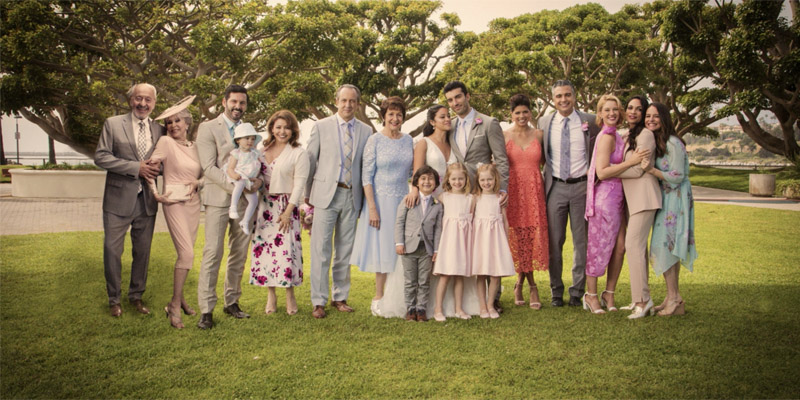
Jane the Virgin, Season Five
Drew: Jane the Virgin is a straight show. It’s a sweeping love story that centers three people who are very cisheteronormative. And yet as the show went on, more and more queer characters popped up. Some characters came out, others were introduced. By the show’s end, not only were two main subplots focused on queer women’s relationships, but even Mateo was gay!
I think Jane the Virgin made a point that just because your show isn’t a queer show doesn’t mean it shouldn’t be filled with queer people. We exist and including us in all stories will only make them more true and interesting.
Carmen: Truly the greatest, gayest show that about a heterosexual romance of our time.



“Drew: I would actually push back against labeling Rose’s death as burying a gay.
Carmen: Drew, they literally buried a gay! She was lesbian. She died. The trope is only three words long for a reason.”
I CACKLED A+
also this write up was fantastic, thank you for the feelings!
“Valerie Anne: It’s cute how you all think Rose is dead.”
Valerie Anne for the win!
ok didn’t have a chance to respond to this in the roundtable so saying here that I 100% agree with this sentiment from Drew: “I love queer villains. I don’t love when queerness is villainized. That distinction is very clear to me and most of the time I think the show treated them right.”
team rafael or team michael?
the only correct answer is team petra
All I can say is that Jane gave Petra a bigger, “I love you,” than she gave Rafael.
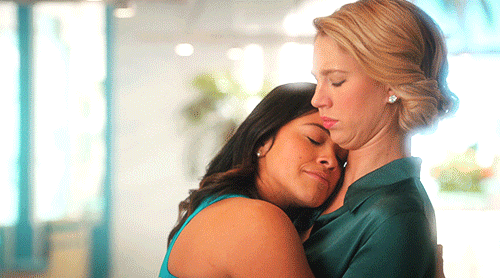
I loved this recap/round table! Thank you for the chance to have even more JTV feelings! I especially loved what Carmen and Natalie said about Petra coming out and coming into herself!
I did not notice Mateo being gay, where did y’all see that??
In one of the last (second to last?) episodes when Baby’s mom, the matchmaker, mentions that NYC has the highest amount of singles or smthng like that, the narrator comes out as gay when he says he shouldn’t move to NYC after all when he finds out single women outnumber single men. Then in the final episode, we find out Mateo is the narrator! After his reading at the wedding, he says Rogelio’s mom told him he would be good at voiceover work, and then the narrator says “And for the record, I am.” So Mateo is the narrator and the narrator is gay= Mateo is gay
YEP! This is our logic, too! Thank you Liz for explaining the detective work!
Jane the Virgin is by far the best TV show I’ve ever watched (and I watch an excessive amount of tv). The stories, the details, the acting–they were unbelievably excellent and funny and obviously crafted with so much care and love. Before this, I didn’t know that a show could make me feel so delighted. I will miss it so much, but I’m excited to start rewatching it, especially as someone who came out and came into themselves during the lifespan of this show.
Watching this show through from beginning to end over the last five years has felt a bit like devouring an entire wedding cake – delighting in the decadent artistry of each new layer, becoming a little overstuffed with the cloying sweetness, but being unable to stop until every morsel is finished. So I guess my advice to someone starting a binge-watch would be make sure to have an extra-large box of Kleenex and a valu-pack of Rolaids on hand? And stay hydrated.
Great post! I love this show so much and I’m really sad it’s over!
I had set the finale aside because I wasn’t ready to say goodbye, then when I finally watched it this was published the next day. Your timing is as impeccable as the narrator’s. This show provides the most joyful catharsis!
I lapsed in my near religious watching of JtV and have been putting off the last season because I need all my emotional energy for life things right now. I was going to put off reading this too (because spoilers) but I needed just a hint of Jane in my life until I’m ready for the feelings fest that’s coming. Also honestly I am glad to have these spoilers because now I will feel safe knowing all my hoped for outcomes happen! As much as I love the idea of a show ending with a woman deciding that she could be single and that was as valid as getting married, it would have been bitter sweet for Jane to end that way, for Jane or Petra (And for the record, I have never liked Michael)